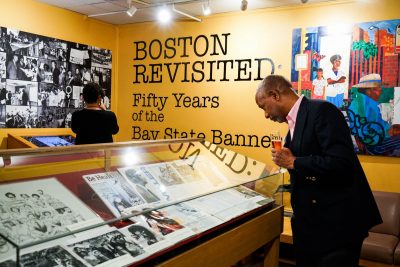
It was a quiet Sunday afternoon among the stacks of Boston University’s Mugar Memorial Library, with the exception of the bustling Howard Gotlieb Memorial Gallery on the first floor. Within the center, visitors socialized, snacked and viewed 50 years of history for the black community in Boston through photos taken by newspaper the Bay State Banner.
The reception was held for the opening of a new exhibit hosted by the Howard Gotlieb Archival Research Center, titled “BOSTON REVISITED: Fifty Years of the Bay State Banner.”
The Bay State Banner is an independent, African-American-owned news weekly that focuses on topics and issues that impact New England’s local black and English-speaking Latino community. It was founded in 1965 by Melvin B. Miller, who continues to work for the publication as its editor and publisher.
The exhibition features a collection of photographs from the Bay State Banner’s archives in Gotlieb’s Richards-Frost Room, which were introduced by a lineup of speakers ending with Miller.
Christopher Gately, Gotlieb’s Research and Public Information Administrator, worked alongside interns Cecily Donovan and Cadence Seeger to curate the exhibition. According to Gately, the Bay State Banner’s photo archives contained “about 36 boxes of Bay State material” consisting of “60 plus thousand photographs.”
“I [curate] about 30 exhibitions a year but have never really done an exhibit focused on photographs before,” Gately said. “This is more visual-based than paper-based.”
The exhibition is separated into different sections for news, politics, editorials, arts, sports, education and business. Each section contains dozens of photos featuring individuals ranging from athletes and politicians known across the country to people known and loved among their communities.
At the reception, visitors pointed out family members and childhood friends spotted in the photos, which have been digitized for use as a future resource for the Bay State Banner as well as interested researchers, according to Gately.
In addition to the photos on display, the event also celebrated the publication of an essay collection published in July titled “Boston’s Banner Years: 1965–2015: A Saga of Black Success,” which was edited and written by Miller in collaboration with a team of writers who have worked for the Bay State Banner.
At the opening reception, Miller lectured about his work over the years, and after, made time to sell and sign copies of his book.
In a 2016 interview with the Edward M. Kennedy Institute for the United States Senate, Miller said that though publishing the Bay State Banner was not his life’s passion, he did so because he saw a need for a black newspaper in Boston during the civil rights movement.
“I think that without the Banner, the city of Boston would have been in very severe racial difficulty,” Miller said in the interview.
In an interview with The Daily Free Press, Miller said that he saw the need to portray Boston’s black residents from a different perspective than some other media outlets.
“The major media does not always cover the progressive aspects of the black community,” Miller said. “The press likes to focus on conflict, dispute, hostilities, but there’s more than that.”
Event speakers and attendees alike said they thanked Miller and the Bay State Banner throughout the reception for the paper’s contributions to the Boston black community.
Alum Alice Gray, ‘68 graduate of the College of Arts and Sciences, attended the exhibition’s opening while visiting BU’s campus for Alumni Weekend, which occurred throughout last weekend.
As a person of color, Gray said she turned to the Bay State Banner for coverage that was specific to her community.
“In the ‘50s, the Bay State Banner was a source of news you don’t get in the Globe,” she said.
Gray recalls that she “used to go to stores in the South End after church” to purchase copies.
As a Brookline native and current resident, Gray, like other reception attendees, said she recognized people in the photos. The reception brought many members of her community together and gave her the opportunity to reconnect with them.
“I know a lot of people in the photographs,” Gray said. “A lot of people I haven’t kept in touch with. But now, we can. In terms of personalities, people haven’t changed.”
The exhibition is open through Friday from 9:30 a.m. to 4:30 p.m.

















































































































